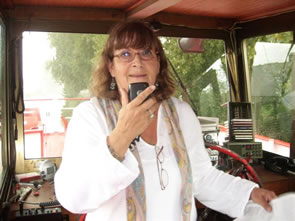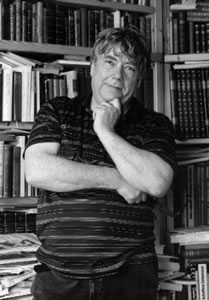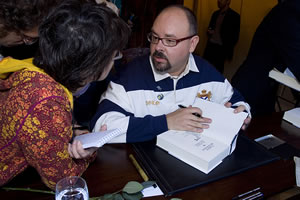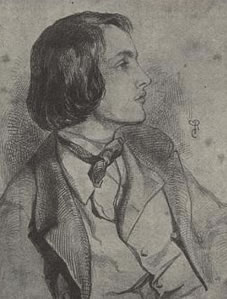De Belgische dichteres en schrijfster Patricia Lasoen werd geboren op 25 september 1948 in Brugge. Zie ook mijn blog van 25 september 2008. en ook mijn blog van 25 september 2007 en mijn blog van 25 september 2006.
Genadeloos en fluitend
Treinen: hun weg is voorgebaand,
ze zoeven door het landschap
genadeloos; soms lijken ze wel wreed
zoals ze onbarmhartig bermen vol
met bloeiend onkruid achterlaten –
en dan, hoe ze zich in beweging zetten:
nauwelijks merkbaar eerst
met kleine schokjes, en pas na een tijd
komen ze tot hun volle kracht
en fluitend razen ze voorbij signaal
en overweg, en over water
ze komen dan geruisloos stil –
een schok kaatst soms onzacht
hun inhoud en hun doel terug.
Frambozen staan vanzelf
met liefde in verband:
hun zachte huid en nauwelijks voelbare haartjes
worden liefst tegelijk met
lippen, tong en huig geproefd
langzaam smelten ze open
en naderhand weer dicht
je hoeft ze zelfs niet aan te raken –
direct nadien zijn ze ontastbare herinnering.

Patricia Lasoen (Brugge, 25 september 1948)
De Duitse dichter, schrijver en literatuurwetenschapper Herbert Heckmann werd geboren op 25 september 1930 in Frankfurt am Main. Zie ook mijn blog van 25 september 2007 en ook mijn blog van 25 september 2008.
Uit: Die sieben Todsünden
” (…) Sein dreißigstes Jahr gedachte er mit einem Fest zu eröffnen, für sich, seine Freundinnen und seine Freunde, reimte Trinksprüche, kaufte ein, daß er krumm ging unter den Lasten, wählte ein rosiges Ferklein aus, die saftigen Lenden eines Hammels, geschmeidige Kalbsnieren, Spargel und Trüffel, Hähnchen zum Introitus und Karamelcrème als Epilog, Käse von Tilsit bis Edam, dazu Trockenbeerenauslese aus fürstlichen Fässern.
Max musste die Taschenuhr seines Vaters versetzen und den Hochzeitsschmuck seiner Mutter, um den frechen Forderungen der Händler ge
wachsen zu sein, verschloß sich dann siegesgewiß in der Küche, stimmte in seinem hungrigen Baß dies und das Trinkliedlein an, daß die Fensterscheiben erzitterten und die Teller schepperten. Er tanzte zwischen Ofen und Tisch, zwischen Tisch und Schrank, zwischen Schrank und Wasserhahn hin und her, Alchemist und Henker zugleich, und las aus den weißgelben Wölkchen, die unter den Deckeln hervorzischten, die hungrige Zukunft. Die zundertrockene Kehle benetzte er, um sich frei zu machen von der schon verdauten Vergangenheit. Der Duft der Gewürze hüllte ihn ein und rötete seine Wangen. (…) ”

Herbert Heckmann (25 september 1930 – 18 oktober 1999)
De Spaanse schrijver Carlos Ruiz Zafón werd geboren op 25 september 1964 in Barcelona. Zie ook mijn blog van 25 september 2006 en ook mijn blog van 25 september 2007 en ook mijn blog van 25 september 2008.
Uit: The Angel’s Game
“A writer never forgets the first time he accepted a few coins or a word of praise in exchange for a story. He will never forget the sweet poison of vanity in his blood and the belief that, if he succeeds in not letting anyone discover his lack of talent, the dream of literature will provide him with a roof over his head, a hot meal at the end of the day, and what he covets the most: his name printed on a miserable piece of paper that surely will outlive him. A writer is condemned to remember that moment, because from then on he is doomed and his soul has a price.
My first time came one faraway day in December 1917. I was seventeen and worked at The Voice of Industry, a newspaper that had seen better days and now languished in a barn of a building that had once housed a sulfuric acid factory. The walls still oozed the corrosive vapor that ate away at furniture and clothes, sapping the spirits, consuming even the soles of shoes. The newspaper’s headquarters rose behind the forest of angels and crosses of the Pueblo Nuevo cemetery; from afar, its outline merged with the mausoleums silhouetted against the horizon–a skyline stabbed by hundreds of chimneys and factories that wove a perpetual twilight of scarlet and black above Barcelona.
On the night that was about to change the course of my life, the newspaper’s deputy editor, Don Basilio Moragas, saw fit to summon me, just before closing time, to the dark cubicle at the far end of the editorial staff room that doubled as his office and cigar den. Don Basilio was a forbidding- looking man with a bushy moustache who did not suffer fools and who subscribed to the theory that the liberal use of adverbs and adjectives was the mark of a pervert or someone with a vitamin deficiency. Any journalist prone to florid prose would be sent off to write funeral notices for three weeks. If, after this penance, the culprit relapsed, Don Basilio would ship him off permanently to the “House and Home” pages. We were all terrified of him, and he knew it.
“Did you call me, Don Basilio?” I ventured timidly.”

Carlos Ruiz Zafón (Barcelona, 25 september 1964)
De Engelse schrijver en criticus William Michael Rossetti werd geboren in Londen op 25 september 1829. Rossetti was een zoon van de uit Italië gevluchte immigrant Gabriele Rossetti en een broer van Maria Francesca Rossetti, Dante Gabriel Rossetti en Christina Rossetti. Samen met zijn broer en onder meer de schilder John Everett Millais behoorde hij tot de oprichters van de kunstenaarsbeweging die bekend werd onder de naam Pre-Raphaelite Brotherhood. Rossetti was een belangrijk voorvechter van de beweging. Hij was redacteur van het tijdschrift The Germ, dat de doelstellingen van de Prerafaëlieten uiteenzette. Het blad beleefde overigens slechts vier edities tussen januari en april 1850. Rossetti was tevens kunstcriticus voor The Spectator. Zijn recensies werden in 1867 verzameld en gepubliceerd onder de titel Fine Art, chiefly Contemporary. Ander werk omvat een vertaling in blanke verzen van Dantes Inferno (1865), Lives of Some Famous Poets (1878), A Life of John Keats (1887) en Pre-Raphaelite Diaries and Letters. In 1874 trouwde hij met Lucy Madox Brown, een dochter van de schilder Ford Madox Brown.
Uit: The Germ. Thoughts towards Nature in Poetry, Literature and Art
„There were in the late summer of 1848, in the Schools of the Royal Academy or barely emergent from them, four young men to whom this condition of the art seemed offensive, contemptible, and even scandalous. Their names were William Holman-Hunt, John Everett Millais, and Dante Gabriel Rossetti, painters, and Thomas Woolner, sculptor. Their ages varied from twenty-two to nineteen—Woolner being the eldest, and Millais the youngest. Being little more than lads, these young men were naturally not very deep in either the theory or the practice of art: but they had open eyes and minds, and could discern that some things were good and other bad—that some things they liked, and others they hated. They hated the lack of ideas in art, and the lack of character; the silliness and vacuity which belong to the one, the flimsiness and make-believe which result from the other. They hated those forms of execution which are merely smooth and prettyish, and those which, pretending to mastery, are nothing better than slovenly and slapdash, or what the P.R.B.’s called “sloshy.” Still more did they hate the notion that each artist should not obey his own individual impulse, act upon his own perception and study of Nature, and scrutinize and work at his objective material with assiduity before he could attempt to display and interpret it; but that, instead of all this, he should try to be “like somebody else,” imitating some extant style and manner, and applying the cut-and-dry rules enunciated by A from the practice of B or C. They determined to do the exact contrary. The temper of these striplings, after some years of the current academic training, was the temper of rebels: they meant revolt, and produced revolution. It would be a mistake to suppose, because the called themselves Præraphaelites, that they seriously disliked the works produced by Raphael; but they disliked the works produced by Raphael’s uninspired satellites, and were resolved to find out, by personal study and practice, what their own several faculties and adaptabilities might be, without being bound by rules and big-wiggeries founded upon the performance of Raphael or of any one. They were to have no master except their own powers of mind and hand, and their own first-hand study of Nature.

William Michael Rossetti (25 september 1829 – 5 februari 1919)
